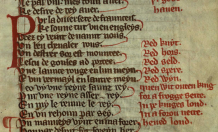Articles

The event will introduce the audience to medieval books, especially how each individual hand-produced copy could be unique depending on the choices of the copyist, or 'scribe'.
Ancient books meet modern technology at a unique event
People can discover how modern technology is being used to reveal the secrets of medieval books at a unique online event.
Participants will get a sneak preview of a University of Exeter project which is uncovering the secrets of how people in England were taught French hundreds of years ago. During the period from the Norman Conquest onward, being multilingual was seen as beneficial for those who wanted to mix in wealthy circles.
A University of Exeter research team have been analysing and editing the Tretiz, a textbook used to teach French in medieval England, in a project funded by UK Research and Innovation.
The event will introduce the audience to medieval books, especially how each individual hand-produced copy could be unique depending on the choices of the copyist, or 'scribe'.
People can find out how the cutting-edge technology used as part of the University of Exeter project is allowing experts to capture and compare the content of medieval books in a better way than traditional print editions can.
Dr Tom Hinton, from the University of Exeter, who is leading the project and event, said: “Nobody needs to know anything about the Middle Ages or digital technologies to enjoy this event. We will take participants behind the scenes of the project, showing them how we are reading and transcribing a manuscript and using digital technology to encode the text so that it can be presented online in a variety of different ways. Audience members will be able to try out these two activities for themselves during the event.
“Medieval books were handwritten and authors were often dead long by the time the copies that survive today were made. For example, the Tretiz was written in the mid-13th century, but the manuscripts being edited for the project range from the late 13th century to the early 15th century. This meant that individual scribes had a freedom to change a text in the way they wanted, often in response to the requirements of the people who had commissioned a copy. Each manuscript offers us a window onto the lives of a particular group of readers.”
A total of seventeen manuscripts of the Tretiz survive today. The project team will edit them all and make each individual version of the text freely accessible online, so that modern readers can enjoy them as they appeared to their original readers. Users will be able to compare sections of the text between manuscripts to see what is unique to each one, or focus on a specific feature of the text. Digital images of each manuscript page will also be available to view alongside the editions. The team expects to have the edition completed by autumn 2021.
The event takes place on Saturday 14th November 2020 from 2pm to 3pm. Please register at https://www.eventbrite.co.uk/e/medieval-books-in-the-21st-century-tickets-117683224693. Contact the team at medievalfrench@gmail.com.
Date: 14 October 2020
